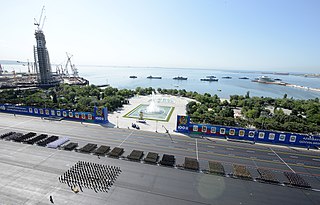Related Research Articles

The British Empire was composed of the dominions, colonies, protectorates, mandates, and other territories ruled or administered by the United Kingdom and its predecessor states. It began with the overseas possessions and trading posts established by England in the late 16th and early 17th centuries. At its height in the 19th and early 20th century, it was the largest empire in history and, for over a century, was the foremost global power. By 1913, the British Empire held sway over 412 million people, 23 per cent of the world population at the time, and by 1920, it covered 35.5 million km2 (13.7 million sq mi), 24 per cent of the Earth's total land area. As a result, its constitutional, legal, linguistic, and cultural legacy is widespread. At the peak of its power, it was described as "the empire on which the sun never sets", as the Sun was always shining on at least one of its territories.

Jawaharlal Nehru was an Indian anti-colonial nationalist, secular humanist, social democrat, statesman and author who was a central figure in India during the middle of the 20th century. Nehru was a principal leader of the Indian nationalist movement in the 1930s and 1940s. Upon India's independence in 1947, he became the first Prime Minister of India, serving for 16 years. Nehru promoted parliamentary democracy, secularism, and science and technology during the 1950s, powerfully influencing India's arc as a modern nation. In international affairs, he successfully maintained India's neutrality throughout the Cold War. A well-regarded author, his books written in prison, such as Letters from a Father to His Daughter (1929), Glimpses of World History (1934), An Autobiography (1936), and The Discovery of India (1946), have been read around the world. The honorific Pandit has been commonly applied before his name.
Bahrain was a central location of the ancient Dilmun civilization. Bahrain's strategic location in the Persian Gulf has brought rule and influence from mostly the Persians, Sumerians, Assyrians, Babylonians, Portuguese, the Arabs, and the British.

Mother's Day is a celebration honoring the mother of the family or individual, as well as motherhood, maternal bonds, and the influence of mothers in society. It is celebrated on different days in many parts of the world, most commonly in the months of March or May. It complements similar celebrations, honoring family members, such as Father's Day, Siblings Day, and Grandparents' Day.

Palestine, officially the State of Palestine, is a state located in the Southern Levant region of Western Asia. Officially governed by the Palestine Liberation Organization (PLO), it claims the West Bank and the Gaza Strip as its territory, though the entirety of that territory has been under Israeli occupation since the 1967 Six-Day War. As a result of the Oslo Accords of 1993–1995, the West Bank is currently divided into 165 Palestinian enclaves that are under partial Palestinian National Authority (PNA) rule; the remainder, including 200 Israeli settlements, is under full Israeli control. The Gaza Strip has been ruled by the militant Islamic group Hamas and has been subject to a long-term blockade by Egypt and Israel since 2007.

The national flag of Qatar is in the ratio of 11:28. It is maroon with a broad white serrated band on the hoist side. It was adopted shortly before the country declared independence from the United Kingdom on 3 September 1971.

A national day is a day on which celebrations mark the nationhood of a nation or state. It may be the date of independence, of becoming a republic, of becoming a federation, or a significant date for a patron saint or a ruler. The national day is often a public holiday. Many countries have more than one national day. Denmark and the United Kingdom are the only two countries without a national day. National days emerged with the age of nationalism, with most appearing during the 19th and 20th century.

The Bangladesh Liberation War was a revolution and armed conflict sparked by the rise of the Bengali nationalist and self-determination movement in East Pakistan, which resulted in the independence of Bangladesh. The war began when the Pakistani military junta based in West Pakistan—under the orders of Yahya Khan—launched Operation Searchlight against the people of East Pakistan on the night of 25 March 1971, initiating the Bangladesh genocide.

Many nations around the world observe some kind of Armed Forces Day to honor their military forces. This day is not to be confused with Veterans Day or Memorial Day.
In the United Kingdom, public holidays are days on which most businesses and non-essential services are closed. Many retail businesses do open on some of the public holidays. There are restrictions on trading on Sundays, Easter Day and Christmas Day in England and Wales and on New Year's Day and Christmas Day in Scotland. Public holidays defined by statute are called bank holidays, but this term can also be used to include common law holidays, which are held by convention. The term "public holidays" can refer exclusively to common law holidays.

Independence Day is celebrated annually on 15 August as a public holiday in India commemorating the nation's independence from the United Kingdom on 15 August 1947, the day when the provisions of the Indian Independence Act, which transferred legislative sovereignty to the Indian Constituent Assembly, came into effect. India retained King George VI as head of state until its transition to a republic, when the Constitution of India came into effect on 26 January 1950 and replaced the dominion prefix, Dominion of India, with the enactment of the sovereign law Constitution of India. India attained independence following the independence movement noted for largely non-violent resistance and civil disobedience.

The Arab states of the Persian Gulf refers to a group of Arab states which border the Persian Gulf. There are seven member states of the Arab League in the region: Bahrain, Kuwait, Iraq, Oman, Qatar, Saudi Arabia, and the United Arab Emirates. Yemen is bound to the six countries of the Gulf Cooperation Council, based on history and culture.

The Dominion of Pakistan, officially Pakistan, was an independent federal dominion in the Commonwealth of Nations, existing between 14 August 1947 and 23 March 1956, created by the passing of the Indian Independence Act 1947 by the British parliament, which also created an independent Dominion of India.

Thanksgiving is a national holiday celebrated on various dates in the United States, Canada, Grenada, Saint Lucia, Liberia, and unofficially in countries like Brazil and Philippines. It is also observed in the Dutch town of Leiden and the Australian territory of Norfolk Island. It began as a day of giving thanks for the blessings of the harvest and of the preceding year.. Thanksgiving is celebrated on the second Monday of October in Canada and on the fourth Thursday of November in the United States and around the same part of the year in other places. Although Thanksgiving has historical roots in religious and cultural traditions, it has long been celebrated as a secular holiday as well.

Independence Day, observed annually on 14 August, is a national holiday in Pakistan. It commemorates the day when Pakistan achieved independence and was declared a sovereign state following the termination of the British Raj in August of 1947. Pakistan came into existence as a result of the Pakistan Movement, which aimed for the creation of an independent Muslim state in the north-western regions of British India via partition. The movement was led by the All-India Muslim League under the leadership of Muhammad Ali Jinnah. The event was brought forth by the Indian Independence Act 1947 under which the British Raj gave independence to the Dominion of Pakistan which comprised West Pakistan and East Pakistan. During that time, In the Islamic calendar, the day of independence coincided with Ramadan 27, the eve of which, being Laylat al-Qadr, is regarded as sacred by Muslims.

Bahrain, officially the Kingdom of Bahrain, is an island country in Western Asia. It is situated on the Persian Gulf, and comprises a small archipelago made up of 50 natural islands and an additional 33 artificial islands, centered on Bahrain Island which makes up around 83 percent of the country's landmass. Bahrain is situated between Qatar and the northeastern coast of Saudi Arabia, to which it is connected by the King Fahd Causeway. The current population of Bahrain is 1,870,817 as of May 14, 2023, based on elaborations of the latest United Nations data, of whom 712,362 are Bahraini nationals. Bahrain spans some 760 square kilometres (290 sq mi), and is the third-smallest nation in Asia after the Maldives and Singapore. The capital and largest city is Manama.
The decolonisation of Asia was the gradual growth of independence movements in Asia, leading ultimately to the retreat of foreign powers and the creation of several nation-states in the region.

The Independence Day of Ghana is a national holiday celebrated yearly. This day is an official state holiday for the citizens of Ghana both within and in the diaspora to honour and celebrate the Heroes of Ghana who led the country to attain its independence. The Independence Day is celebrated on March 6 every year. Independence Day is also remembrance of the day that marks the declaration of Ghanaian independence from the British colonial rule. The first Prime Minister of Ghana; Kwame Nkrumah became the Head of Government from 1957 to 1960. On 6 March 1957 Kwame Nkrumah declared to the people of Ghana about their freedom, he added that, "the African People are capable of managing their own affairs and Ghana our beloved country is free forever." Ghana was the first country in sub-Saharan Africa to achieve its independence from European colonial rule. Many Ghanaians who have had the opportunity to serve as president have remembered the occasion and made Ghana Independence Day a public holiday to celebrate. Granting the day as a national holiday is well recognized such that, if 6 March of a year fell on a weekend of the Independence Day celebration, the working day that follows which is a Monday will be granted and observed as a holiday by the whole nation. Many Presidents from other African countries and Europe have been invited to Ghana to join in the celebration either as Guest Speakers or Invited Guests since the reign of former President Kwame Nkrumah till now.
References
- 1 2 Hume, Cameron R. (1994). The United Nations, Iran, and Iraq: How Peacemaking Changed . Indiana University Press. pp. 24. ISBN 978-0-253-32874-8.
- ↑ Federal Research Division (2004). Bahrain. Kessinger Publishing. p. 17. ISBN 978-1-4191-0874-7.
- ↑ Blaustein, Albert P.; Sigler, Jay A. (1977). Independence Documents of the World. Vol. 1. Brill Publishers. pp. 45–58. ISBN 978-0-379-00794-7.
- ↑ "Fireworks to mark National Day of Bahrain". World News. 8 July 2010. Retrieved 8 December 2013.
- ↑ "A Guide to the United States' History of Recognition, Diplomatic, and Consular Relations, by Country, since 1776: Bahrain".